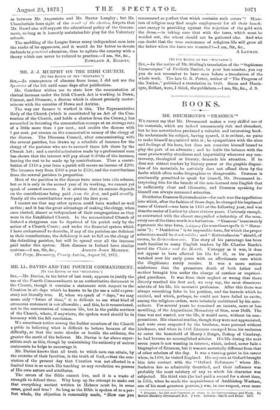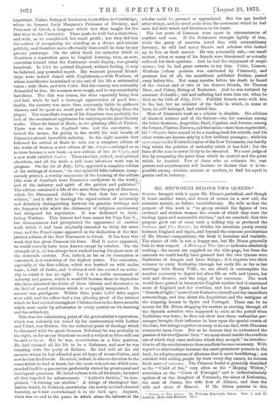BOOKS.
MR. DRUMMOND'S " ERASMUS."*
WE cannot say that Mr. Drummond makes a very skilful use of his materials, which are indeed uncommonly rich and abundant, but he has nevertheless produced a valuable and interesting book. He understands his subject, having spared, it is evident, no pains to make himself acquainted with it ; he sympathises with the aims and feelings of his hero, but does not conceive himself bound to play the part of an advocate ; and he holds the balance with the most praiseworthy steadiness and impartiality whenever any con- troversy, theological or literary, demands his attention. If ho does not attract readers by literary power or the graphic disposi- tion of his materials, he certainly does not offend them by the faults which often make biographies so disagreeable. Erasmus is continually permitted to speak for himself, Mr. Drummond in- terpreting him for the benefit of the non-learned into English that is sufficiently clear and idiomatic, and Erasmus speaking for himself can always command attention.
Desiderius Erasmus Rotterodamius—for such was the appellation into which, after the fashion of those days, he changed his baptismal name of Gerard—was born in 1466 or the following year, and was thus the senior of Luther by about sixteen years. Curiously enough, as contrasted with the almost unequalled scholarship of the man, every one of the three words is a barbarism. " Erasmus" inaccurately represents the true form, ipico-pdo; (he sometimes spells it " Heras- mius ") ; " Desiderius " is an impossible form, for which the proper substitute would be desiderabilis ; and " Rotterodamius " should, of course, be Rotterodamensis. The story of his parentage has been made familiar to many English readers by Mr. Charles Reade's novel the Cloister and the Hearth. Unhappy as it was, it does not appear to have affected his life for ill, as his parents watched over his early years with an affectionate care which the illegitimate rarely receive. It was a more serious misfortune that the premature death of both father and mother brought him under the charge of careless or unprinci- pled guardians. It was from their neglect or wrong that there directly resulted the first and, we may say, the most disastrous mistake of his life, his monastic profession. After this there was always something false in his position, and the hatreds which he excited, and which, perhaps, be could not have failed to excite, among the religious orders, were infinitely embittered by his ante- cedents. For several years he remained an inmate, more or less unwilling, of the Augustinian Monastery of Sion, near Delft. The time was not wasted, nor the life, it would seem, without its com- pensations. His classical studies, though they were not appreciated, and were even suspected by the brethren, were pursued without hindrance, and when in 1491 Erasmus emerged from his seclusion to enter the household of Henry it Bergis, Bishop of Cambray, he bad become an accomplished scholar. His life during the next seven years is not wanting in interest, which, indeed, never fails a biographer of Erasmus, but it was not materially different from that of other scholars of the day. It was a turning-point in his career when, in 1498, he visited England. His sojourn at Oxford brought him into contact with the " Oxford Reformers " whom Mr. Seebohm has so admirably described, and their influence was probably the most salutary of any to which his character was subjected. His third visit (ho had paid a second for a short time, in 1505, when he made the acquaintance of Archbishop Warham, one of his most generous patrons,) was, in one respect, even more • Erasmus his Life and Character, as shown in his Correspondence and Works, By Robert Shelley Drummond, B.A. 2 vole. London: Smith and Elder. 1875. important. Fisher, Bishop of Rochester, invited him to Cambridge, where he became Lady Margaret's Professor of Divinity, and Professor of Greek, a language which was then taught for the first time in the University. These posts he held but a short time, and with, as he complained, but small profit ; but they did him the service of recognising his standing as a divine and scholar publicly, and therefore more effectually than could be done by any private patronage. On the other hand, the stimulus which so illustrious a reputation gave to English learning, then, as now, somewhat behind what the Continent could display, was greatly beneficial. In 1514 he quitted England, without feeling, it may be believed, any powerful regret. His warmest personal friend- ships were indeed shared with Englishmen,—with Warham, of whose munificence he retained to the end of his life a substantial token ; with More, and with Colet. But the country was eminently distasteful to him. Its manners were rough, and he was remarkably fastidious. The diet was coarse, the wine especially being dear and bad, while he had a thorough appreciation of good fare ; finally, the country was more than commonly liable to epidemic diseases, and he spent no small part of his life in flying from the plague. The immediate reason of his departure was probably the lack of the mechanical appliances for carrying on his great literary works. These he found at Basle, in the printing office of Froben. There was no one in England who had the enterprise, or indeed the means, for giving to the world the vast results of Erasmus's almost incredible industry. In the eight months that followed his arrival at Basle he sent out a complete edition of the works of Seneca, a new edition of the Adayia—enlarged so as to have become a new book—a new edition of the De Copia, and a new work entitled Similes. These two last, indeed, were printed elsewhere, and all the while a still more laborious work was in progress. On the 1st of July, 1516, appeared a complete edition of the writings of Jerome, "in nine splendid folio volumes, sump- tuously printed, a worthy monument of the learning of the editors the sons of Auerbach were Erasmus's coadjutors in the work], and of the industry and spirit of the printer and publisher." The edition contained a life of the saint from the pen of Erasmus, which Mr. Drummond thinks " the best that has ever been written," and it did to theology the signal service of accurately and definitely distinguishing between his genuine writings and the forgeries with which the dishonesty of religious controversy had disfigured his reputation. It was dedicated to Arch- bishop IVarham. This honour had been meant for Pope Leo X., but circumstances had precipitated the appearance of another work which it had been originally intended to delay for some time, and the Pope's name appeared in the dedication of the first printed edition of the New Testament in Greek. It has been this work that has given Erasmus his fame. Had it never appeared, he would scarcely have been known except by scholars. On the strength of it, he has always been ranked among the great men of the sixteenth century. Nor, indeed, as far as its conception is concerned, is it unworthy of the highest praise. The execution, especially of the first edition, which was hurried on with undue haste, is full of faults, and it claimed and has secured an autho- rity to which it has no right. Yet it is a noble monument of industry and genius, which it would ill become those to depreciate who have inherited the fruits of those labours and discoveries in the field of sound criticism which it so happily inaugurated. Its success was prodigious. Within three years 3,300 folio copies were sold, and the editor had a less pleasing proof of the interest which he had excited throughout Christendom in the fierce assaults which were made by adversaries in every quarter on his learning and his orthodoxy.
This was the culminating point of the great scholar's reputation, which was certainly not raised by his controversies with Luther and Ulrich von Hutten. On the technical point of theology which he discussed with the great German Reformer he was probably in the right, so far as any disputant on such a subject as Free-will can be said to be so. But be was, nevertheless, in a false position. lie had claimed all his life to be a Reformer, and now he was breaking with the party of Reform. He had still all his old enemies whom he had offended past all hope of reconciliation, and now he lost his friends. Ile acted, indeed, in sincere devotion to the cause which he had at heart, but the cause was not one which com- mended itself to a generation profoundly stirred by great moral and theological questions. Ile loved culture with all his heart ; he hated all that impeded its advancement. " Luther's faction," he com- plained, "is ruining our studies." A deluge of theological bar- barism would, he believed, overwhelm the newly revived classical learning, as it had overwhelmed it in the dark ages. Anyhow, there was an end to the peace in which alone the labours of the scholar could be pursued or appreciated. But the age heeded other things, and he stood aside from the movement which he had once led with wrath and bitterness in his heart.
The last years of Erasmus were spent in circumstances of comfort and ease. If the Reformers thought lightly of him, while the party of reaction hated him with extraordinary fervency, he still had many friends and scholars who looked up to him as their master. He was personally safe,—no small matter, when so many of his friends were threatened or actually suffered for their opinions. And he had the enjoyment of ample means ; but he had great sorrows to try him. Colet, Linacre, Warham (whose pension was continued by Cranmer), and greatest loss of all, the munificent publisher Froben, passed away before him. Not many months before his death he heard of the violent end of two of his dearest friends, Sir Thomas More, and Fisher, Bishop of Rochester. And he was tortured by constant ill-health ; toil and suffering had worn him out, when he died on the 12th of July, 1536. Faithful friends were with him to the last, but no minister of the faith to which, in name at least, he still belonged, had visited him.
Most of Erasmus's work as a scholar is obsolete. His editions of classical authors and of the fathers—the list contains among the latter Ambrose, Augustine, Basil, Cyprian, and Jerome; among the former, Plautus, Terence, and Suetonius—have been superseded ; his Colloquies have ceased to be a reading book for schools, and his other works are known only by a few brilliant passages ; while his opus magnum, the Textus Receptus of the New Testament, can hardly long retain the position of authority which it has held ; but the fame of the man is never likely to be obscured. We must judge of him by comparing the point from which he started and the point which he reached. Few of those who so estimate his vast powers and acquirements will hesitate to declare that it is im- possible among scholars, ancient or modern, to find his equal in genius and in industry.































 Previous page
Previous page